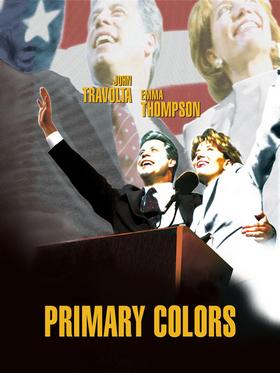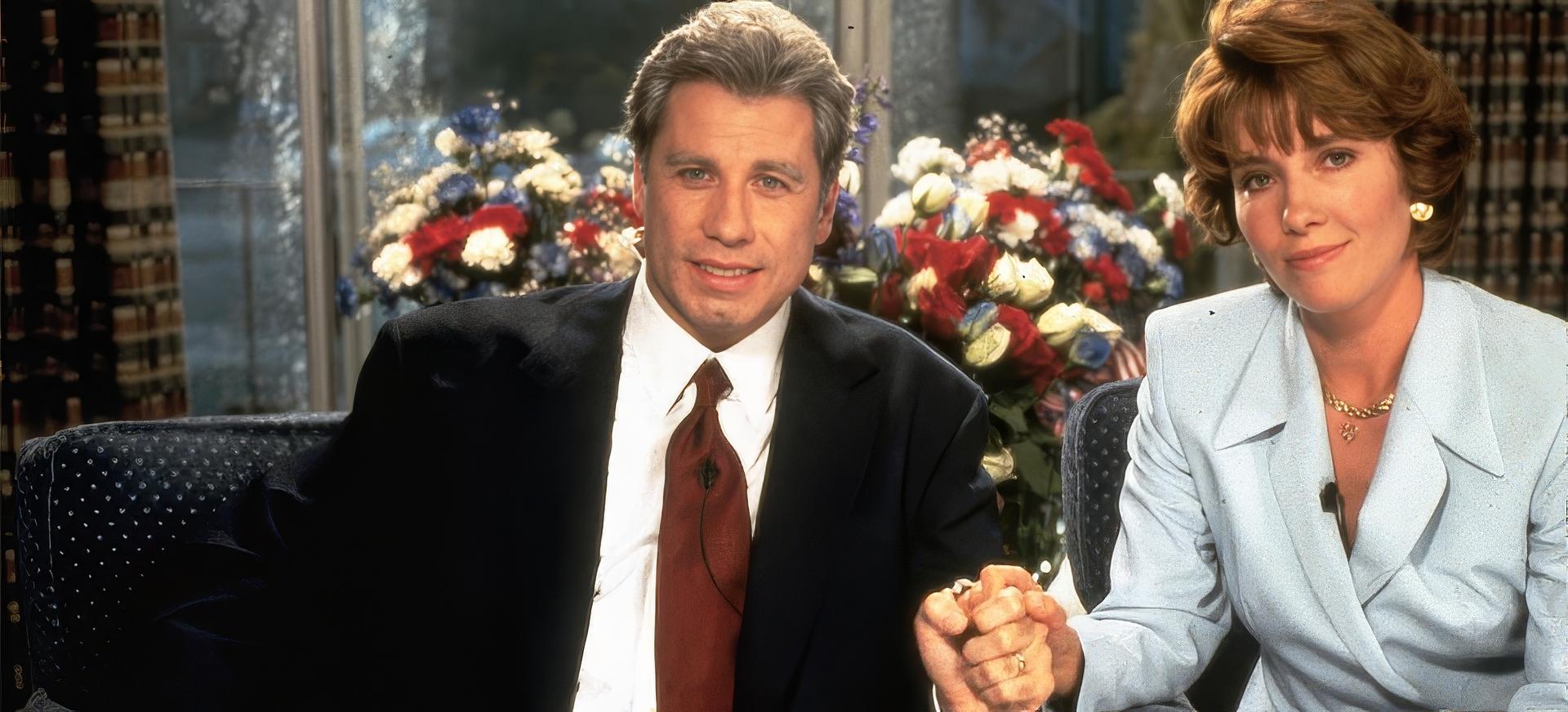Primary Colors
 for strong language and sexual references.
for strong language and sexual references.
Reviewed by: Brian Nigro
CONTRIBUTOR
| Moral Rating: | Very Offensive |
| Moviemaking Quality: |
|
| Primary Audience: | Adults |
| Genre: | Political Comedy Drama |
| Length: | 2 hr. 23 min. |
| Year of Release: | 1998 |
| USA Release: |
March 20, 1998 |

Bill and Hilary Clinton
Media spin doctors
What part should MORALITY play in politics?
Does CHARACTER matter in political leaders?
VOTING—Do Christians have an obligation to vote?
| Featuring |
|---|
|
John Travolta … Governor Jack Stanton Emma Thompson … Susan Stanton Billy Bob Thornton … Richard Jemmons Kathy Bates … Libby Holden Allison Janney … Miss Walsh Diane Ladd … Mamma Stanton James Earl Jones … CNN Voiceover (voice) Tony Shalhoub … Eddie Reyes Rob Reiner … Izzy Rosenblatt Adrian Lester … Henry Burton Maura Tierney … Daisy Larry Hagman … Gov. Fred Picker See all » |
| Director |
|
Mike Nichols |
| Producer |
|
Mike Nichols Sandy E. Scott |
| Distributor |
“Primary Colors,” an affecting satire of American politics, is rated “R” for substantial profanity, of both sexually suggestive and generally crude varieties. Keeping that warning in mind, this is a surprisingly provocative—if not controversial—story that will surely pique the interest of discerning Christian adults. Director Mike Nichols shapes this material into a morality tale of sorts, a disarming statement on idealism.
Loosely based on the also-profane book by Anonymous (former Newsweek writer Joe Klein, whose mother probably washed his mouth out with soap when she discovered who it was), “Primary Colors” charts the fictitious presidential campaign of one Jack Stanton (John Travolta) through the eyes of Henry Burton (Adrian Lester). We meet Stanton’s wife Susan (Emma Thompson) and her gabby friend Lucille (Caroline Aaron); in the campaign office, we meet the foul-mouthed campaign manager Richard Jemmons (Billy Bob Thornton) and abrasive gun for hire Libby Holden (Kathy Bates).
The Stanton campaign faces several hurdles that recall the actual Clinton campaign of 1992—anti-war protests, Gennifer Flowers, high cholesterol diet, and so on. There is an uncomfortable sense of déjà vu in these scenes, including references to Monica Lewinsky and Kathleen Willey (the latter two, of course, occurred after this movie was already finished.)
Unlike the recent “Wag The Dog”, which inadvertently used Clinton for its basic set-up only, “Primary Colors” dogs a certain former Southern governor specifically and explicitly in scene after scene after scene. John Travolta didn’t pull that hairdo and accent out of thin air; that’s the Commander-in-Chief and all plot devices point back to him.
What will make or break this movie for most audiences is the expectations. Despite the political principals, this is not a big political movie and there are no really big revelations here. Clearly, this is potentially entertaining for those who watch C-SPAN for fun and can name current Cabinet members without Rush Limbaugh’s help; that goes without saying. The audience for “Primary Colors” is the same audience for the book, and the “star value” of John Travolta won’t change that.
A minor error in this movie is that WHICH campaign Stanton is running is never clearly defined. Because his rival, a last-minute replacement played by Larry Hagman, is running on a “character matters”-oriented, family-values ticket, some viewers may assume he’s Republican. Wrong. Both candidates are running for the Democratic nomination. “The American President,” a recent example, clearly defined the candidates accordingly, but there are no such concessions here.
The emotional baggage in this movie is carried entirely by Kathy Bates’ character, the openly lesbian Libby. Not by Stanton or his wife, but by Libby. (Note: there are two scenes where she kisses a campaign worker, both times in her kitchen at breakfast time.) Supposedly, Henry is the idealistic one, the African-American whose girlfriend can’t understand his enthusiasm for Stanton.
As the movie develops, however, Libby is the truly idealistic one, and the dirty politics takes its toll on her. The movie never explores Libby’s influence on Henry, though it becomes apparent he eventually loses faith in his idealism.
From a Christian perspective, the message of “Primary Colors” that idealism is naive is perhaps more offensive than the constant profanity (literally hundreds of crude phrases, or one a minute.)
From an artistic perspective, the satire is overshadowed by the dramatic value; and, that dramatic value is what makes the movie so compelling and entertaining.
Bottom line: For discerning adults only.


Unlike “Wag The Dog,” the characters in “Primary Colors” are faced with clear moral choices. There is the decision to follow a charismatic leader they know to be morally corrupt. There are others, to lie and cover up, to hurt and ruin and injure, in the hope that all will be redeemed by some greater good in the future.
I, also, felt that Primary Color’s depiction of media spin doctors was closer to the mark, too. Unlike those in “Wag The Dog,” they are shown as warped, mendacious and unprincipled, but also lonely and unhappy people. “Primary Colors” also let me see the Clinton matter as a tragedy, not only for the person, but for all those who loved and worked for him and who he so casually, so selfishly, so uncaringly, betrayed.
The movie does a good job of showing the ends justifies the means philosophy that every leftist “leader” in history has used to impose their version of what is “good” for we the people who are obviously too stupid (in Mr Stanton {Clinton} and his wife’s opinion) to figure this out on our own let alone go to God for guidance. This dialectic is well portrayed. Aside from this there is little value to spending an afternoon or evening on this so called movie. Walk the dog, clean the toilet or twiddle your thumbs you’ll be all the farther ahead. Besides it really isn’t like the book.
Apparently nothing gets done in a straight-forward manner, but requires lying, bribery, sexual favors and lots of money. The movie was a good quality production, but the subject was more than distasteful.


My Ratings: Moral rating: Very Offensive / Moviemaking quality: 2½